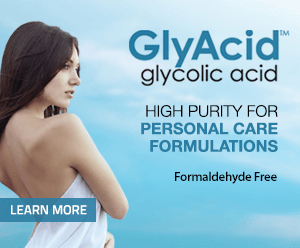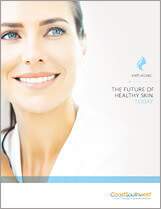The latest movement to hit the industry is cleanical skincare. The intersection of “clean” and “clinical,” cleanical skincare is a thoroughly modern category.
“The clean movement has successfully tapped into a millennial desire for sustainable and natural beauty routines. But amplifying alongside it has been the rise of anti-bacterial beauty. This year has made us seek safety from terms like “medical grade”, “sterilized” and “clinically approved.” The cleanical trend has emerged as a reassuring marriage of “clean” products created in clinical environments,” explains Elle Turner in Glamour.
Combining both the desire for natural skincare products and rigorously researched formulations, cleanical skincare is poised to be a dominant industry trend over the next five years.
A hybrid movement
To start, what is cleanical skincare? In order to understand this category, defining the clean skincare label and the clinical skincare label is key.
However, neither clean nor clinical have government-regulated definitions. Instead, the labels “clean” and “clinical” largely depend on the consumer’s personal definition or a brand’s interpretation of the category. But, despite this fluidity, there are widely accepted tenets of both clean and clinical skincare.
Clean skincare
Clean skincare typically refers to products formulated without a long list of ever-changing ingredients that could cause potential irritation or other negative side effects.
“Clean skincare prioritizes human and environmental health and restricts ingredients that are harmful to that. Clean skincare uses nutritious, plant-based ingredients as much as possible, and safe synthetics as necessary for preservation or performance,” Tara Foley, founder of clean beauty emporium Follian, told Martha Stewart.
Many consumers also associate clean skincare with natural, eco-friendly, or sustainable ingredients.
Clinical skincare
Meanwhile, clinical skincare typically refers to skincare products packed with active ingredients that have long histories of delivering results.
“Clinical skincare could be considered a marketing term, but there’s no other way to describe it. You could call it ‘low pH skincare’ or ‘low molecular skincare’, and it is medical grade and is going to penetrate into the skin,” clinical aesthetician Pamela Marshall told Flair.
Clinical skincare products are also frequently defined as “medical grade” or “prescription strength” skincare.
“Medical grade skincare is skincare that is targeted to specific medical conditions and needs, such as acne or wrinkle. The concentration of active ingredients is generally greater than what you can find over the counter, and they have been tested to be effective on the skin, hence there are greater results with such skincare,” Purvisha Patel, dermatologist, told Byrdie.
Clean + clinical
Cleanical skincare combines elements of both clean skincare and clinical skincare.
“Marry the ‘formulated without’ philosophies of the ‘clean beauty’ movement, layer in the anti-contamination innovations and you have clinically led, consciously formulated, lab-grown beauty for a new era and a new reinvention of ‘clean,’ Alexia Inge, co-founder of Cult Beauty, told Glamour UK.
Cleanical skincare most appeals to natural-leaning consumers who still want safe, efficacious, scientifically researched formulations.
Cleanical skincare combines the clean and clinical claims for a thoroughly modern movement!
Driving the movement
Perhaps the most important driver behind the new cleanical skincare movement is the impact COVID-19 has had on skincare consumer demands. Before the pandemic, the desire for clean, natural, and organic skincare was at an all-time high.
“Clinically led, consciously formulated, lab-grown beauty for a new era and a new reinvention of clean.”
Alexia Inge, Glamour UK
However, with the advent of the novel coronavirus, the need for natural became less important than the need for safety and effectiveness. Skincare consumers became more concerned than ever about claims like:
- Sanitization
- Safety
- Anti-microbial
- Anti-bacterial
- Sterilized
- Clinically approved
- Scientifically researched
- High purity
In short, clean consumers once wary of chemical, synthetics, preservatives, and other common ingredients are now embracing the science of skincare.
“The crisis has triggered some new consumer attitudes and also has intensified beliefs and practices that were already entrenched. According to Beautystreams, a global beauty industry research group, the key takeaway is that science, well-being and ecology will drive the industry forward for the foreseeable future,” explains Daniela Ferreira in Happi.
Cleanical skincare is an attempt to appeal to the consumers who want natural ingredients and proven, lab-tested results. Increasingly, this is accomplished with lab-grown or lab-created ingredients, high-purity ingredients, safe synthetics, and contemporary preservative systems.
Embracing cleanical
Once seen as conflicting categories, clean and clinical skincare have now combined into the hybrid cleanical movement. For formulators, cleanical skincare is a welcome trend that embraces the scientific research driving superior formulations. For skincare consumers, cleanical skincare offers safety, effectiveness, and visible results.




